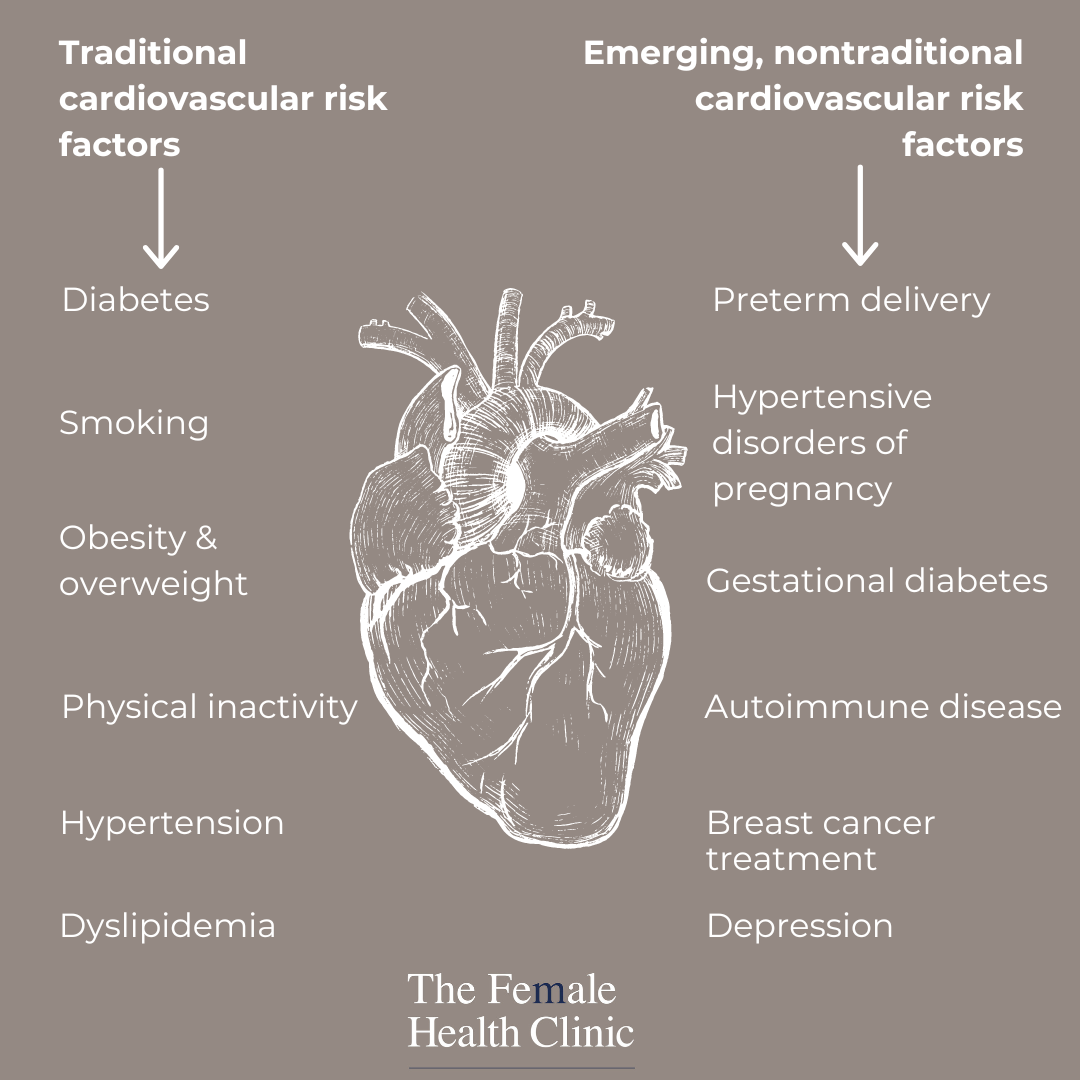In this blog we look at cardiovascular disease, why people tend to regard it as a male health concern, why a woman’s risk of a heart attack or stroke increases after menopause, and the common signs and symptoms you need to be aware of.
Heart disease is not just a man’s disease.
Did you know that cardiovascular disease (CVD) is the leading cause of death in women, both in Europe and worldwide. Yet, compared to men, women are typically underdiagnosed and under treated and tend to have a lower perception of the risk.
But why is it that?
Difference in the causes and clinical presentation of cardiovascular disease in women leads to misdiagnosis and often symptoms are dismissed as anxiety-related.
Research has also identified a gender gap in care during or following a heart attack and women have a higher chance of receiving the wrong initial diagnosis after a heart attack.
Furthermore, there is insufficient awareness among women and medical professionals of sex-specific symptoms and presentation of cardiovascular disease. Women tend to present with different symptoms than men and are more likely to suffer from pain in the arm, shortness of breath, wheezing, coughing, and feeling sick, sweaty, anxious, and dizzy.
Newly emerging risk factors for Women and Cardiovascular Disease
Traditional risk factors for cardiovascular disease, such as high cholesterol, high blood pressure, diabetes, and obesity, affect both men and women.
However, as research continues, non-traditional risk factors for cardiovascular disease in women are also a consideration and include pregnancy complications such as preterm delivery preeclampsia, post-pregnancy weight gain, depression (especially in young women), treatment for breast cancer, cancer treatments, and autoimmune diseases.

Why are women more at risk of heart disease during menopause?
Before menopause, women generally have a lower risk of being affected by coronary heart disease, but after menopause, the risk increases.
As levels of oestrogen decrease during menopause, this can lead to an increased risk of cardiovascular disease. Oestrogen has several beneficial effects on the cardiovascular system, including improving healthy cholesterol levels, reducing plaque buildup in the arteries, and promoting healthy blood vessel function.
There is growing evidence that Hormone Replacement Therapy (HRT) can help to replenish oestrogen levels, potentially reducing the risk of heart disease. Due to the change in hormones during perimenopause and menopause, it is common for women to experience anxiety and heart palpitations. If these symptoms are menopause-related, then HRT is a very effective treatment to help reduce them.
Additionally, here at the clinic, we provide alternate services for patients unable to use HRT to help reduce the risk of cardiovascular disease. These include specialists to advise on lifestyle changes such as maintaining a healthy diet, exercising, losing weight, quitting smoking, and introducing techniques to manage blood pressure, heart palpitations, stress, and anxiety using cognitive behavioural therapy (CBT). These services also complement and work nicely alongside HRT.
What are the warning signs to be aware of?
We feel there is a genuine need for women to request a referral to a specialist for cardiovascular risk assessment – especially those with a history of high blood pressure and high cholesterol, who smoke, have difficulty managing a healthy weight, or are physically inactive.
Some of the signs and symptoms to be aware of are as follows:
- Palpitations/ funny turns/ blackouts
- Breathlessness on exertion
- Deterioration in exertion capacity
- Chest pain/chest tightness
- Ankle swelling
- Difficulty breathing at night-time
If you experience all or any of these symptoms, you should seek medical advice
Some hints and tips on how to keep your heart healthy
Finally, we focus on keeping your heart healthy. Here are some tips to help reduce your risk of developing heart disease:
- Stay physically active – aim for at least 30 minutes of moderate exercise most days of the week.
- Eat a heart-healthy diet – focus on fruits, vegetables, lean proteins, and wholegrains.
- Manage stress – find healthy ways to cope with stress – for example practising mindfulness, meditation, or yoga.
- Know your family history – it helps to know if you have a family history of stroke or heart disease.
- Get regular check-ups – be proactive about your heart health.
We hope you find these tips helpful and take them to heart (pun intended).
Remember, your heart health is in your hands, so take care of it!
Cardiology services at The Female Health Clinic
Not all perimenopause and menopause symptoms are solely menopause related, and some will need further investigation.
Our cardiovascular service is led by Dr. Kaushik Guha, an esteemed Consultant Cardiologist who has published a substantial amount of peer-reviewed scientific papers and book chapters. He specialises in all aspects of general cardiology, including:
- Peri/menopause and heart symptoms
- Cardiovascular Disease
- Myocarditis
- Coronary Artery Disease
- Long Covid – multi disciplinary approach
- High cholesterol managed with Inclisiran
- Heart Failure
- Cardiomyopathy
Having Dr. Guha as part of our clinical team means that our patients can get an immediate referral for cardiovascular assessment if required.
Call 01252 915333 or email info@thefemalehealthclinic.co.uk if you would like to know more about our full cardiac service, including echocardiogram, ECG, heart monitoring, and help and support for Long Covid.
Appointments with Dr. Guha are available at our Hartley Wintney and Farnham clinic
Additionally, heart screening is part of our AgeWell membership, a comprehensive annual screening programme that helps you take an active and preventative approach to your future health and well-being.
